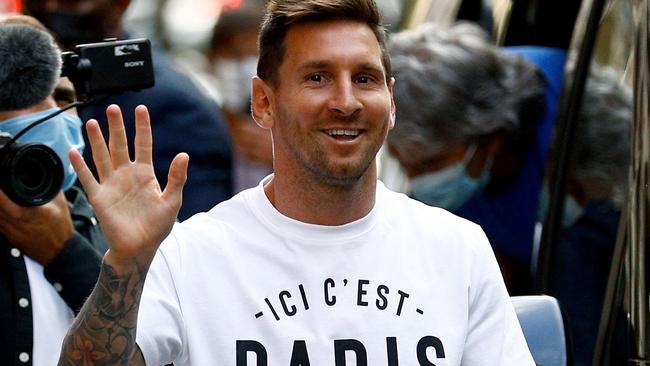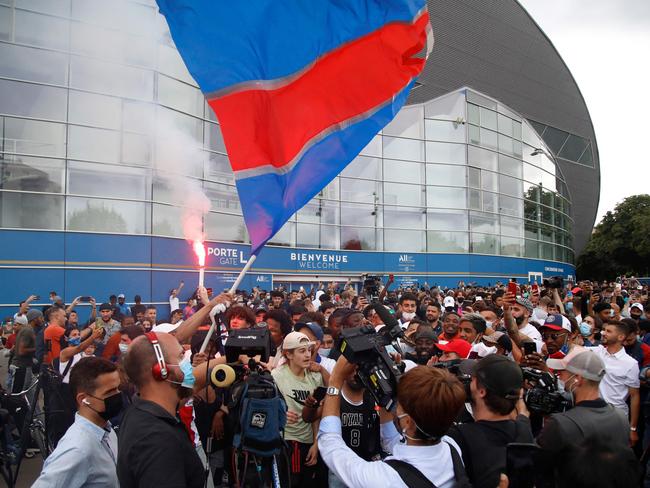Lionel Messi completes stunning move to Paris Saint-Germain
Only a handful of teams on the planet could afford an annual salary widely reported as exceeding $40m after tax.

Lionel Messi was barely 13 years old when he sobbed across the Atlantic on a 12-hour flight from Argentina to Spain. It was the trip that would change his life forever.
The teenage prodigy was heading to FC Barcelona, the team he never thought he would leave.
More than 20 years later, Messi is on the move again.
Widely regarded as the greatest player on the planet, Messi flew to Paris on Tuesday to complete the most stunning and momentous transfer in recent memory by joining Paris Saint-Germain as a free agent. The club also teased his unveiling in a not-so-cryptic tweet touting the arrival of a “New Diamond in Paris.”
Fans had already been gathering at Paris’s Le Bourget private airport and the Parc des Princes stadium in case he showed up since Monday.
“I gave everything for this club, for this shirt from the first day I arrived until the very last, and the truth is that I’m leaving,” Messi said of Barcelona during a tearful news conference on Sunday. “I’d love to be able to go in a different way. I never imagined having to say goodbye because I’d never thought of it.”
Where Messi might end up had been soccer’s burning question ever since Barcelona announced on Friday that they had failed to agree on a new contract that complied with the Spanish league’s rules on spending.
All of a sudden, after 778 appearances and 672 goals, Barca’s Messi era had come to a close. The 34-year-old who still calls Barcelona his home was open to offers.
Only a handful of teams on the planet could afford a base salary that has been widely reported as exceeding $40 million after tax. They were the free-spending super-clubs backed by Russian billionaires, such as Chelsea, or Middle Eastern petrostates, like Manchester City and PSG.

As it happened, PSG moved the fastest. Backed by an arm of Qatar’s sovereign-wealth fund, this was the moment it had never dared believe was possible.
“We did everything we could because I wanted to stay,” Messi said Sunday. “Last year, I didn’t want to stay, and I said it. And this year I wanted to say, and I couldn’t.”
Even as one of the most ambitious sporting projects on the planet, PSG couldn’t have imagined such a blockbuster.
In the decade since the Qatari takeover, PSG has spent over $1 billion in talent to achieve its twin goals of winning trophies and improving Qatar’s image in the world. (The country is also hosting the 2022 World Cup.) So it was no surprise in the early years when PSG targeted players who were magnets for publicity on and off the field, such as David Beckham and Zlatan Ibrahimovic.
In 2017, PSG planted another flag by spending 220 million Euros to make the Brazilian forward Neymar the most expensive player in the world.
At the same time, Qatar had already attached its name to the Messi brand years earlier when Qatar Airways became Barcelona’s jersey sponsor. Every fan with Messi’s name on the back of a Barça shirt was also a fan with the emirate’s name on the front.
But actually signing Messi for PSG, the Qatari flagship, seemed like a pipe dream — at least until the past 12 months.

By moving from La Liga to Ligue 1, Messi would be trading the pitched battle between Spain’s big three — Barcelona, Real Madrid, and Atletico Madrid — for PSG’s dull hegemony atop French soccer. Even though Paris lost the 2020-21 title to Lille, it has won seven of the past nine championships.
The series of events that led to Messi’s exit hardly seemed possible before then. It took a steep decline in the quality of Barcelona’s squad and a string of humiliating exits from the Champions League to plant the idea that the Catalan might no longer give him the chance to win the game’s biggest prizes.
Barcelona hasn’t won the Champions League since 2015 — in fact it hasn’t even come close. Since then, Messi’s great rival Cristiano Ronaldo has lifted the trophy three times and Messi has only gone beyond the quarterfinals once. His years at Barcelona hit rock bottom in 2020, when the club lost 8-2 to Bayern Munich.
That’s when Messi sent what is now known as The Burofax — the official letter to Barcelona’s directors informing them that he wanted out. The legalities soon made it clear that Messi would have to sue to force an exit and so he stuck around. The situation improved enough that Messi now says his true wish to stay beyond 2021 and see out the rest of his career in Barcelona.
“With all the nonsense around the Burofax, I was convinced that I knew what I wanted to say,” he said on Sunday. “But this year, this year is not the same. This year, my family and I were convinced that we were going to stay here, that we were going to stay at home. That’s what we all wanted more than anything.”
But this time, they ran into an obstacle that was too big to overcome: Barca’s crippling debt. Club president Joan Laporta explained in an earlier news conference on Friday that Barcelona’s payroll represented 110% of Barcelona’s income, a crisis far greater than he’d anticipated when he was elected in March. Though Messi said he had offered to take a 50% pay cut, Laporta couldn’t see a way to re-sign Messi and steer clear from potential bankruptcy.
“It would have meant we put the club at great risk,” he said. “The salary mass has a great deal to do with that. There is no margin after a calamitous situation that was all down to the previous board of administrators.”
It’s precisely because of that financial black hole that Barcelona had been one of the lead advocates of the European Super League. The project had promised to inject hundreds of millions of dollars directly into the coffers of the 12 founding members who sought to create a glitzy new competition and leave the Champions League behind.
Though the whole plan collapsed within 48 hours of its unveiling, Barca and Real Madrid have been among the final holdouts, insisting that they hadn’t yet given up on it. That stubbornness, which they say is the only way to rescue the finances of European soccer, also put Laporta at odds with La Liga’s leadership. League president Javier Tebas hasn’t been shy about calling out what he views as Barcelona’s warped priorities. He could not understand, he tweeted, how “the Super League is worth a Leo.”
All of which paved a direct road for Messi from his boyhood club straight to the highest bidder.
“We all wanted to enjoy his magic at Barcelona,” Laporta said. “But it cannot be.”
Dow Jones







To join the conversation, please log in. Don't have an account? Register
Join the conversation, you are commenting as Logout